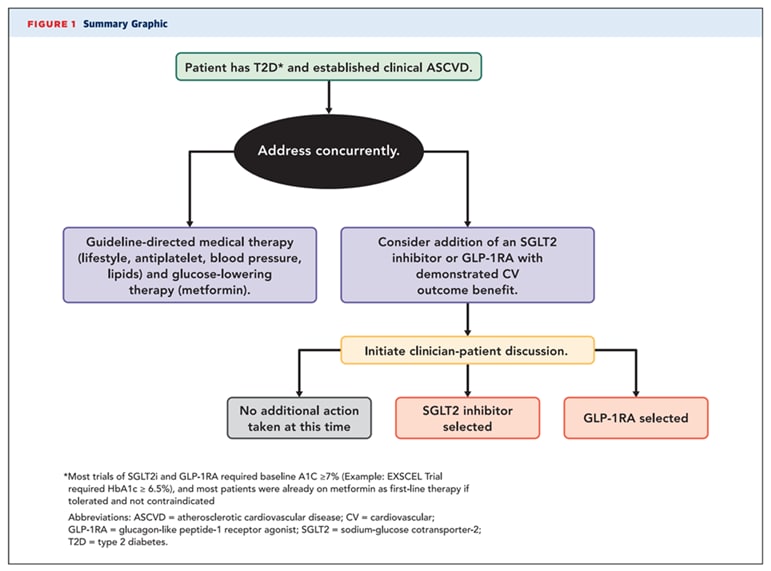Novel Therapies for Cardiovascular Risk Reduction in Patients with Type 2 Diabetes
Written by Keith Miller, MD
Co-Director, Bryan Heart Prevention Clinic
Until recently, the secondary prevention of atherosclerotic cardiovascular events in patients with type 2 diabetes (T2DM) focused on:
- Lifestyle recommendations
- Antiplatelet therapy
- Lipid management primarily with statins
- Blood pressure control
2 out of 3 deaths in people with diabetes are due to Cardiovascular Disease
While aggressive management of non-glucose risk factors yielded major improvements in the natural history of cardiovascular disease (CVD), diabetics still face a major excess risk of heart attack, stroke, congestive heart failure and cardiovascular death compared with those without diabetes. Thus, CVD remains the leading cause of morbidity and mortality in patients with type 2 diabetes.
Treatment for Diabetic Patients with Risk of Cardiovascular Disease
Beginning as an FDA requirement for new diabetes agents in late 2008, cardiovascular outcome trials (CVOTs) have shown compelling evidence of improved cardiovascular and renal outcomes with two classes of agents:
- Sodium-glucose cotransporter 2 inhibitors (SGLT2i)
- Glucagon-like peptide 1 receptor agonists (GLP1RA)
This evidence has led to a paradigm shift in the clinical management of T2DM; while metformin is still the preferred initial pharmacologic agent for the treatment of T2DM, the Standards of Medical Care in Diabetes-2020 recommends that “among patients with T2D who have established atherosclerotic cardiovascular disease or indicators of high risk, established kidney disease, or heart failure, a sodium-glucose cotransporter 2 inhibitor or glucagon-like peptide 1 receptor agonist with demonstrated cardiovascular disease benefit is recommended as part of the glucose-lowering regimen independent of A1C.” Guidelines from the European Society of Cardiology and the European Association for the Study of Diabetes go further, suggesting that SGLT2i’s or GLP1RA’s should be considered first as monotherapy for T2DM patients with ASCVD or high/very high CV risk1.

Preventing Cardiovascular Disease
Prevention of CVD is a central part of the mission of the cardiovascular specialist. A comprehensive approach to CVD risk reduction in the diabetic patient now includes consideration of SGLT2i’s and GLP1RA’s, in addition to traditional strategies focused on lipids, blood pressure and lifestyle. Given the many challenges to the use of and adherence to evidence-based preventive therapies, every member of the care team has an important role. As cardiovascular specialists, we can have a major impact on the use of evidence-based therapies proven to reduce adverse CV outcomes, including heart failure and death.
This requires us to extend our comfort zone to:
- Include glucose control strategies
- Acknowledge the unmet need to optimize care for our patients with T2DM and CVD
- Be prepared to discuss the role newer T2DM drugs play for the individual patient
- Make specific recommendations
Preventative Care for Your Patients: Bryan Heart Prevention Clinic
Bryan Heart is dedicated to partnering with you as the primary care provider, especially in the area of preventative care for patients. We have broadened our services and offer a more encompassing prevention clinic for patients with cardiometabolic, lipid and cardiovascular disease. For more information or to refer a patient to the Bryan Heart Prevention Clinic, please call 402-483-3333.

